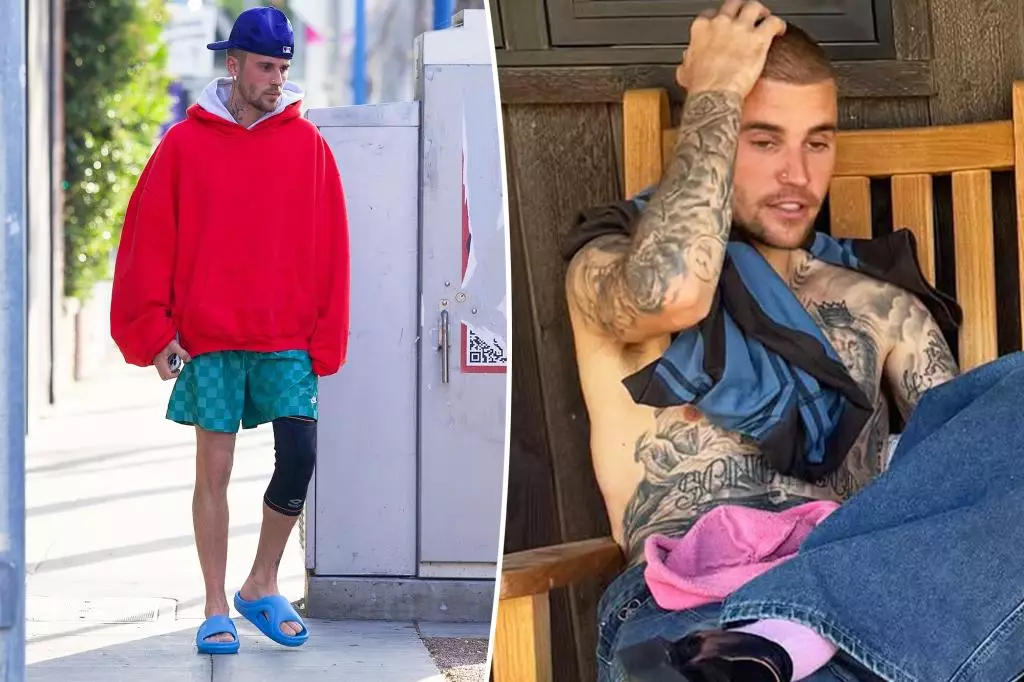Justin Bieber’s journey from a teenage heartthrob to a mature artist grappling with life’s complexities shows the nuanced layers of celebrity life. Recently, he was spotted entering Voda Spa in West Hollywood, sporting a black knee brace on his left leg. This incident raises a multitude of questions about the pressures and challenges he faces, both physically and mentally. While superficial appearances indicate that fame comes with glitz and glamour, the truth often tells a less glamorous story of struggle and vulnerability, especially in the case of someone like Bieber.
The knee injury, the details of which remain undisclosed, only adds to the pile of concerns that have surfaced over the past months. As fans and observers, we often forget that even stars can be plagued by unforeseen physical ailments, which may serve as shadows looming over their public personas. This incident compels us to think: how much do we really know about the well-being of people who seem to have everything?
The Online Persona vs. Reality
Bieber’s recent social media activity has raised eyebrows, particularly regarding his portrayal of casual drug use and interactions with his family. Several photos show the pop star engaging in carefree activities, such as playing with his nine-month-old son, Jack, juxtaposed with more controversial images that depict him smoking a blunt on the same couch. Herein lies a stark contradiction; a father engaged in loving moments with his child yet simultaneously indulging in behaviors widely deemed irresponsible.
These images sparked a firestorm on social media, with fans expressing their outrage over Bieber’s apparent lack of judgment around his child. Are celebrities—especially fathers—held to a higher standard? Should we scrutinize their choices more harshly based on the responsibility that parenthood entails? These questions are not trivial but rather reflect the societal demands placed on public figures.
The Burden of Inevitable Scrutiny
As someone who grew up in the public eye, Bieber is no stranger to criticism—and perhaps this is where his struggles begin. Former colleagues have expressed deep concern for his mental health, with one ex-team member lamenting that “seeing him disintegrate” is equivalent to watching him drift further away from his purpose. This portrayal paints a picture of a man desperately in need of boundaries and support, yet surrounded by a culture that continuously expects him to perform and deliver.
This environment can be both toxic and suffocating. Despite efforts from his team to quell rumors about his mental state by stating that critics are “ill-informed,” the underlying issues remain. If those close to Bieber believe he is in a downward spiral, how are the rest of us supposed to interpret his actions? This becomes a murky landscape where the line between artistry and instability blurs, showing that stars are incredibly human—fraught with their own failings, just like the rest of us.
The Major Facets of Celebrity Culture
Bieber’s situation exemplifies broader conversations about mental health and celebrity culture. In a world where oversharing is the norm, social media platforms often amplify vulnerability and expose flaws. While this can serve as an outlet for authenticity, it can also subject individuals to unprecedented harshness and scrutiny. The juxtaposition of public highs with personal lows creates a paradox: celebrities are idolized yet deeply burdened, acting almost as cautionary tales for those who aspire to fame.
As we observe Justin Bieber’s journey, it is crucial to question what responsibility we, as observers and fans, have in shaping the narrative. Are we empowering or further diminishing individuals battling their demons? The discourse surrounding mental health and personal choices must evolve beyond simple outrage, allowing room for compassion and understanding.
In the end, as Bieber navigates the turbulence of fame, the headlines become a mirror reflecting society’s collective anxiety about mental health, parenting, and the very essence of success. The challenge lies in converting these conversations into opportunities for support rather than judgment, reminding us that every individual—celebrity or otherwise—deserves that chance to find healing.

